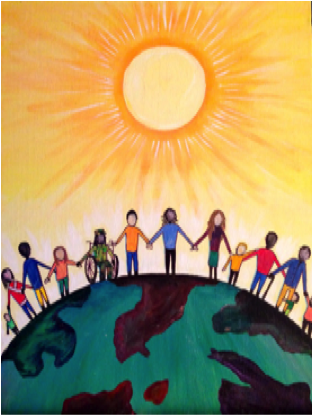Community Mental Wellness and Resilience Act
In 2021, the Trauma Resource Institute - along with over 80 other organizations - endorsed this act in a letter to Congress. Now, Representative Paul Tonko (D-NY) is going to introduce the Community Mental Wellness and Resilience Act (CMWRA) in late October of this year!
The Trauma Resource Institute is a founding member of the International Transformational Resilience Coalition (ITRC) which aim to gather a wide and diverse set of endorsements from national, regional, state, tribal, and local organizations and governments before Rep. Tonko introduces the legislation.
If you are interested in endorsing the act, contact leadership in your organization and click the button below to share the link with them. Keep scrolling for more information.
About the Act
This urgently needed new policy will, for the first time, authorize the Centers for Disease Control and Prevention (CDC) to fund and support community-based initiatives using a public health approach to enhance the capacity for mental wellness and resilience to prevent and heal climate change-generated psychosocial problems.
What Psychosocial Problems Are Prevalent?
Mental health problems are at epidemic levels today.
According to Mental Health America, last year almost 20 percent of adults, or nearly 50 million Americans, experienced a diagnosed mental illness and 5 percent had a severe mental illness.
Natural disasters are aggravating psychosocial problems.
Historic storms, floods, wildfires, heatwaves, droughts, and other disasters generated by the accelerating climate emergency are aggravating these problems. In 2021, more than 40 percent of Americans lived in a county that was impacted by a major natural disaster. Disasters can traumatize 20-40 percent of those who are directly impacted, 10-20 percent of disaster response workers, and 5-10 percent of the general population who are not directly affected but know someone who is or view the events from afar. Consequently, the number of people who experience a mental health problem as a result of a disaster often outweighs those with physical injuries by 40 to 1.
Community traumas are also increasing.
This means an overwhelmingly stressful event or series of events, such as wildfires, floods, or mass shootings traumatize people residing in a specific neighborhood, town, or city.
Our mental health, human services, and disaster mental health systems cannot assist all of the people who experience mental health problems today, and this gap will only grow over time.
We must act now to expand our approach to preventing and healing mental health problems. If you are interested in endorsing the act, contact the leadership in your organization and share this link with them.
What Will This Act Do?
To reduce today's epidemic of mental health problems, and prevent future ones, the Community Mental Wellness and Resilience Act will:
Authorize CDC to establish a grant program to expand existing community-based initiatives and form new ones that use a public health approach to enhance population-level capacity to prevent and heal mental health problems generated by persistent disasters and toxic stresses.
Appropriate $30,000,000 for fiscal years 2023 through 2027 to fund small planning grants of up to $15,000 to help community initiatives get organized, and larger program grants of up to $4 million to support and help expand existing community wellness and resilience initiatives.
The community-based initiatives funded by this program will involve a wide and diverse network of grass-roots and neighborhood leaders, and non-profit, private, and public organizations.
The community initiatives will develop their own age and culturally-appropriate strategies to engage all adults and youth in enhancing and sustaining mental wellness and resilience, with high-risk individuals and those with symptoms of pathology given special attention as part of the larger community effort.
The strategies will use evidence-based, evidence-informed, promising, and/or indigenous practices to engage residents in strengthening existing protective factors, and forming additional ones, to help all adults and youth push back against traumatic stressors, maintain mental wellness, and rapidly recover when they are impacted by toxic stresses or disasters.
Individualized mental health treatment will support community-based wellness and resilience-building activities and assist people who still cannot function, or are at risk of harming themselves or others.

